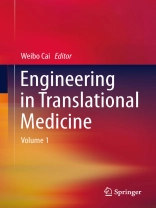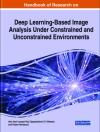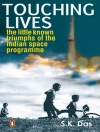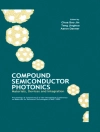This book covers a broad area of engineering research in translational medicine. Leaders in academic institutions around the world contributed focused chapters on a broad array of topics such as: cell and tissue engineering (6 chapters), genetic and protein engineering (10 chapters), nanoengineering (10 chapters), biomedical instrumentation (4 chapters), and theranostics and other novel approaches (4 chapters). Each chapter is a stand-alone review that summarizes the state-of-the-art of the specific research area.
Engineering in Translational Medicine gives readers a comprehensive and in-depth overview of a broad array of related research areas, making this an excellent reference book for scientists and students both new to engineering/translational medicine and currently working in this area.
The ability for engineering approaches to change biomedical research are increasing and having significant impact. Development of basic assays and their numerous applications are allowing for many new discoveries and should eventually impact human health. This book brings together many diverse yet related topics to give the reader a solid overview of many important areas that are not found together elsewhere. Dr. Weibo Cai has taken great care to select key research leaders of many sub-disciplines who have put together very detailed chapters that are easy to read yet highly rich in content.
_______________
This book brings together many diverse yet related topics to give the reader a solid overview of many important areas that are not found together elsewhere. Dr. Weibo Cai has taken great care to select key research leaders of many sub-disciplines who have put together very detailed chapters that are easy to read yet highly rich in content. It is very exciting to see such a great set of chapters all together to allow one to have a key understanding of many different areas including cell, gene, protein, and nano engineering aswell as the emerging field of theranostics. I am sure the readers will find this collection of important chapters helpful in their own research and understanding of how engineering has and will continue to play a critical role in biomedical research and clinical translation.
Sanjiv Sam Gambhir M.D., Ph.D.
Stanford University, USA
Engineering in Translational Medicine is a landmark book bridging the fields of engineering and medicine with a focus on translational technologies and methods. In a single, well-coordinated volume, this book brings together contributions from a strong and international scientific cast, broadly covering the topics. The book captures the tremendous opportunities made possible by recent developments in bioengineering, and highlights the potential impact of these advances across a broad spectrum of pressing health care needs. The book can equally serve as a text for graduate level courses, a reference source, a book to be dipped into for pleasure by those working within the field, or a cover-to-cover read for those wanting a comprehensive, yet readable introduction to the current state of engineering advances and how they are impacting translational medicine.
Simon R. Cherry, Ph.D.
University of California, Davis, USA
Inhoudsopgave
1. Engineering in Translational Medicine: An Introduction.- 2. Stem Cells: The Holy Grail of Regenerative Medicine.- 3. Engineering T Cells to Target Tumor Cells.- 4. Engineering Biomaterials for Anchorage-Dependent and Non-Anchorage-Dependent Therapeutic Cell Delivery in Translational Medicine.- 5. Tissue Engineering Applications for Peripheral Nerve Repair.- 6. Structure, Function and Development of Blood Vessels: Lessons for Tissue engineering.- 7. Engineering Gene Activated Matrices for the Repair of Articular Cartilage Defect.- 8. Engineering Luciferases for Assays and Imaging.- 9. Engineered Split Reporter Systems for Molecular Imaging of Protein-Protein Interactions in Living Subjects.- 10. Engineering Aspects of Bioluminescence Resonance Energy Transfer Systems.- 11. Antibody Engineering in Translational Medicine.- 12. Engineered Affibodies in Translational Medicine.- 13. Alternative Protein Scaffolds for Molecular Imaging and Therapy.- 14. Engineering Multivalent and Multispecific Protein Therapeutics.- 15. Engineering Aptamers for Biomedical Applications: Part 1.- 16. Engineering Aptamers for Biomedical Applications: Part 2.- 17. Engineering DNA Vaccines for Cancer Therapy.- 18. Multifunctional Nanoscale Delivery Systems for Nucleic Acids.- 19. Engineering Nanomaterials for Biosensors and Therapeutics.- 20. Engineering Fluorescent Nanoparticles for Biomedical Applications.- 21. Magnetic Nanoparticles for Biomedical Applications: From Diagnosis to Treatment to Regeneration.- 22. Engineering Upconversion Nanoparticles for Biomedical Imaging and Therapy.- 23. Engineering of Mesoporous Silica Nanoparticles for in Vivo Cancer Imaging and Therapy.- 24. Engineering Carbon Nanomaterials for Stem Cell-Based Tissue Engineering.- 25. Engineering Peptide-Based Carriers for Drug and Gene Delivery.- 26. Activation Approaches on Delivery of Imaging and Therapeutic Agents.- 27. Opportunities for New Photodynamic Molecular Beacon Designs.- 28. Engineering the next generation PET detectors.- 29. Photoacoustic Imaging: Development of Imaging Systems and Molecular Agents.- 30. Engineering Miniature Imaging Instruments.- 31. Engineering Small Animal Conformal Radiotherapy Systems.- 32. Plasmonic Nanobubbles for Cancer Theranostics.- 33. Cell-Based Microfluidic Assays in Translational Medicine.- 34. Engineering of Photo-Manipulatable Hydrogels for Translational Medicine.- 35. Engineering AApeptides for Translational Medicine.
Over de auteur
Dr. Weibo Cai is an Assistant Professor of Radiology, Medical Physics, and Biomedical Engineering at the University of Wisconsin – Madison. After receiving a Ph D degree in Chemistry from UCSD in 2004, Dr. Cai did his post-doctoral research at the Molecular Imaging Program at Stanford University. In February 2008, Dr. Cai joined the University of Wisconsin – Madison as a Biomedical Engineering Cluster Hire, and his research is focused on molecular imaging and nanotechnology (http://mi.wisc.edu/).
Dr. Cai has authored >120 peer-reviewed articles (total citation: >6, 000; H-index: 39), >10 book chapters, and guest-edited many special topic issues for peer-reviewed journals. Dr. Cai has served on the Editorial Board of >20 journals, performed peer-review for >100 journals, participated in many grant review panels, chaired many sessions of international conferences, among others. Dr. Cai is currently the Executive Editor of the American Journal of Nuclear Medicine and Molecular Imaging (http://www.ajnmmi.us).
Dr. Cai has received many prestigious awards, including the Society of Nuclear Medicine and Molecular Imaging (SNMMI) Young Professionals Committee Best Basic Science Award (2007), European Association of Nuclear Medicine Springer Prize (2011), American Cancer Society Research Scholar (2013-2017), among many others. Trainees in the Cai group at UW – Madison have received >20 Awards, including a 2012 SNMMI Berson-Yalow Award, 2012 SNMMI Radiopharmaceutical Sciences Council Young Investigator Award, 2013 SNMMI Cardiovascular Council Young Investigator Award, DOD BCRP Post-doctoral Fellowship (2011-2014), and ~10 travel awards to international scientific conferences.












